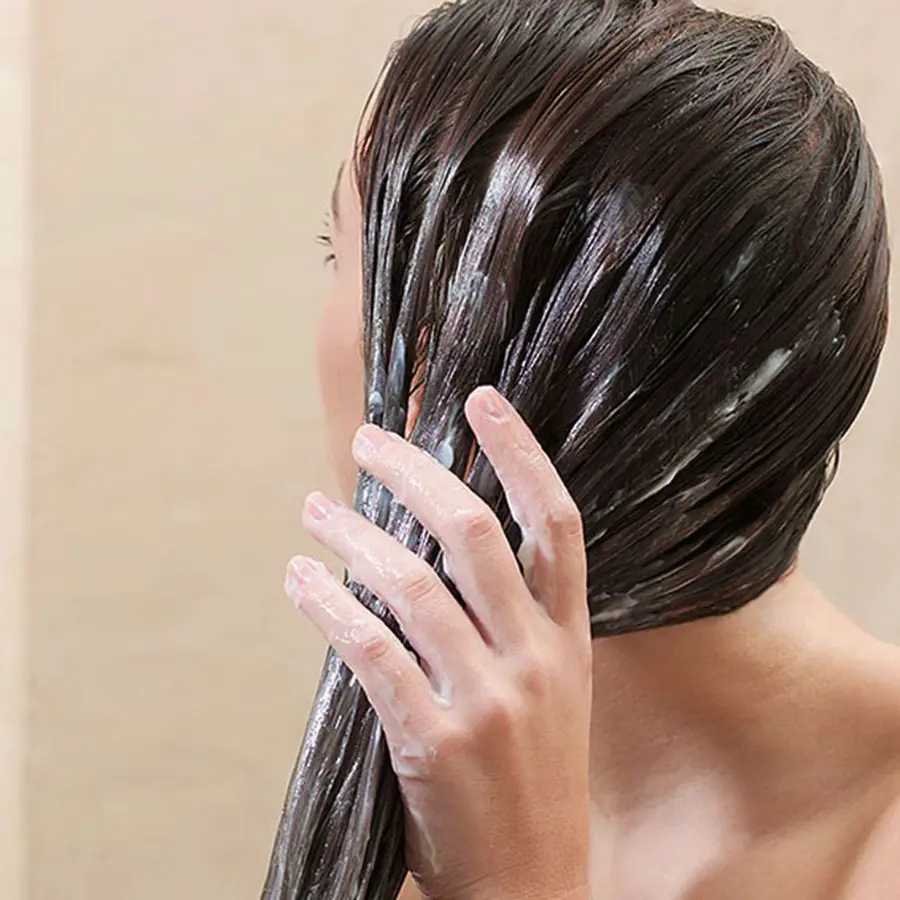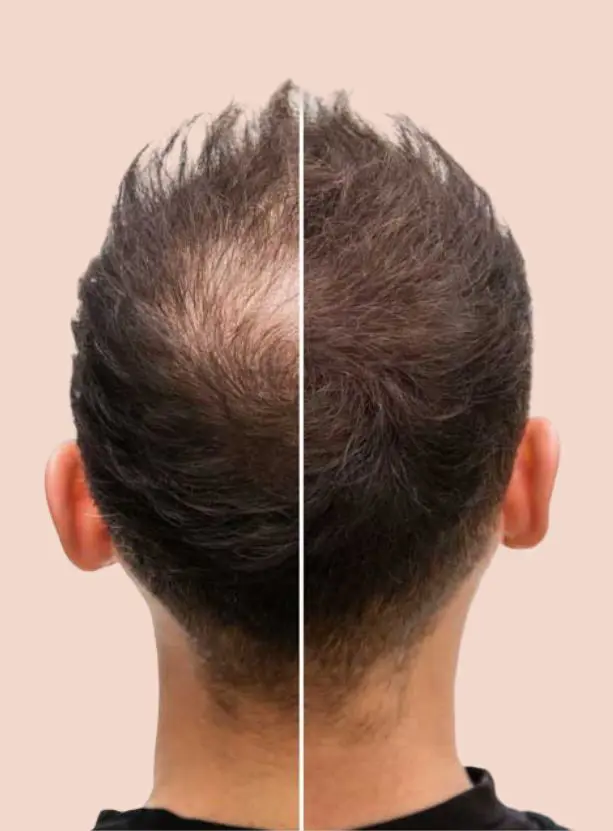Saltwater often evokes images of sunny beach days and carefree waves, but what impact does it really have on your hair? While it can provide a natural, beachy look and add texture, saltwater also has the potential to dry out and damage your strands.
Understanding both the benefits and drawbacks of saltwater on your hair can help you make informed choices and keep your locks looking their best. Let's explore how saltwater affects your hair and what you can do to balance its effects.
Is Salt Water Good for Hair?
Saltwater can offer some benefits for hair, particularly in terms of adding natural texture and volume. It enhances your hair's natural waves and creates a beachy, tousled look without the need for additional styling products.
The salt acts as a natural texturizer, giving hair a fuller appearance and helping to maintain curls and waves. Additionally, saltwater can help remove excess oil and product buildup, leaving your scalp feeling cleaner and fresher.
In addition to cleaning your scalp, here are the top 6 benefits of salt water-
1. Enhanced Texture
Saltwater enhances hair texture by adding a natural grit that helps define and amplify waves and curls. When saltwater dries on the hair, it leaves behind tiny salt crystals that cling to the strands, creating a slight roughness. This texture helps hair hold its shape and form more naturally, resulting in a relaxed, beachy look.
The added texture makes curls and waves appear more tousled and voluminous, giving the hair a fuller and more effortless appearance.
2. Increased Volume
The salt in seawater or ocean water swells the hair shaft slightly, creating a fuller, more buoyant effect. This swelling adds texture and lift, making hair appear thicker and more voluminous. As a result, fine or limp hair gains a more dynamic and robust appearance.
The natural buoyancy provided by saltwater helps to enhance the overall volume, giving your hair a vibrant and lively look without relying on volumizing products or techniques. So, if someone asks is ocean water good for hair, the answer is a hard yes!

3. Natural Hold
The salt creates a slight tackiness that helps maintain the shape of curls and waves without the need for synthetic styling products. This natural grip allows your hair to hold its style and form more effectively, providing a subtle, long-lasting hold that mimics the effect of sea breezes on your hair.
The result is a more effortlessly styled look with added texture and definition, reducing the reliance on gels or sprays.
4. Clarifying Effect
The salt’s natural cleansing properties help dissolve and lift away residues that can accumulate over time. This cleansing action not only helps to rid the hair of unwanted buildup but also provides a purifying effect that can revitalize the scalp.
As a result, your hair may feel lighter and more refreshed, with a reduction in greasy or weighed-down sensations.
5. Exfoliation
Saltwater provides a gentle exfoliation for the scalp due to the presence of coarse salt particles. These particles help to slough off dead skin cells and unclog pores, promoting a healthier scalp environment. This mild abrasive action can reduce buildup and flakiness, leading to a cleaner, more balanced scalp.
As salty water clears impurities and dead skin, it slowly starts to benefit scalp health, which can contribute to better hair growth and overall hair vitality. This natural exfoliation gives a refreshed and invigorated scalp as well as enhances your hair's appearance.

6. Anti-fungal Properties
The salt in ocean water creates a harsh environment for many fungi and bacteria, helping to inhibit their growth. This can be beneficial for addressing scalp issues like dandruff or fungal infections, as the salt's drying effect can reduce excess moisture that fungi thrive on.
Additionally, the salt in ocean water can help cleanse the scalp, potentially reducing inflammation and irritation associated with fungal conditions.
Types of Salt Water
Saltwater varies based on its source and composition. Here are the main types of saltwater:
• Ocean Water
It is the most prevalent type of saltwater, covering over 70% of the Earth's surface. Ocean water is characterized by its consistent salinity of approximately 35 parts per thousand (ppt), which means it contains about 35 grams of salt per liter. This consistency is due to oceans' vastness and complex water circulation systems.
Ocean water can add natural texture and volume to your hair, provide a subtle styling hold, and help with cleansing and exfoliation. However, if used frequently without proper hydration and care, it can also lead to dryness and potential damage.
• Sea Water
Unlike ocean water, seawater's salinity can vary significantly based on local conditions. For instance, the Mediterranean Sea has a higher salinity due to high evaporation rates and limited freshwater inflow. In comparison, the Baltic Sea has a lower salinity because of substantial freshwater inputs from rivers.
With its variable salinity, seawater can enhance hair texture and volume while providing a natural styling hold. However, it may also cause dryness and color fading if not properly managed with conditioning and rinsing.
• Brackish Water
This water is a mix of saltwater and freshwater, typically found in estuarine and coastal environments such as estuaries, mangroves, and lagoons. Its salinity ranges from about 0.5 to 30 parts per thousand (ppt), making it less saline than ocean or sea water but more saline than freshwater.
Brackish water offers gentle cleansing and may benefit the scalp by reducing excess oil, but its lower salinity can still potentially cause dryness and irritation if used excessively.

• Saline Water
Saline water refers to any water with a higher salinity than freshwater, including seawater and brackish water. It is used in various fields, including medical treatments like saline solutions for hydration, agricultural practices, and industrial processes.
While it can help with gentle clarification and scalp health, excessive use may lead to dryness and color fading, so it’s best used sparingly with proper conditioning.
• Hyper-saline Water
Hyper-saline water is characterized by extremely high salinity, often found in environments such as salt flats, salt pans, and evaporation ponds. The salinity of hyper-saline water can exceed 50 parts per thousand (ppt) and sometimes reach over 300 ppt.
With its exceptionally high salt content, hyper-saline water is generally not considered beneficial for hair or marine animals.
Does Salt Water Damage your Hair?
Saltwater can damage your hair in several ways, including the following-
Dehydrating
Saltwater is highly effective at drawing moisture away from your hair. The salt in the water acts like a sponge, absorbing the natural oils and hydration from your strands. This dehydration can leave your hair feeling dry, rough, and less flexible.
As a result, it can compromise the overall health of your hair, making it more prone to breakage and dullness.
Tangle-Inducing and Frizzy
As the salt causes the hair strands to swell and become rough, they may catch on each other more easily, leading to knots and tangles. Additionally, the drying effect of saltwater can disrupt the hair's natural smoothness, causing it to become frizzy and unmanageable.
This results in a disheveled appearance that can be difficult to style. To minimize tangling and frizz, using a leave-in conditioner or anti-frizz product can help smooth the hair and ease detangling.
Split Ends

Exposure to saltwater can accelerate the formation of split ends. The drying effect of saltwater weakens the hair shaft, making the ends more susceptible to splitting. Split ends occur when the protective outer layer of the hair cuticle is damaged, causing the hair to fray and separate.
This not only affects the appearance of your hair but can also lead to further breakage and uneven growth. Regular trims, combined with proper moisturizing treatments, can help manage and prevent split ends caused by saltwater exposure.
How Does Salt Water Cause Damage?
Yes, salty water,if used incorrectly, might cause significant damage to hair through several interconnected processes. This damage can manifest as dryness, brittleness, frizz, tangling, and increased breakage, all of which negatively affect hair health and appearance.
Hair Shafts Swelling with Water
One of the primary ways salty water damages your clocks is by causing the hair shafts to swell. When hair is exposed to saltwater, the shafts absorb the water, leading to swelling. However, because saltwater contains a high concentration of salt, this absorption isn't as straightforward as with freshwater.
The swelling that occurs can lift the hair cuticle, the outer protective layer of the hair. This can make it rough and more vulnerable to tangling and damage from physical forces like brushing or friction.
The Osmosis Effect
Osmosis is the movement of water through a semi-permeable membrane, such as the hair cuticle. It occurs from an area of lower solute concentration (inside the hair shaft) to an area of higher solute concentration (the saltwater surrounding the hair).
This process can draw moisture out of the hair, leading to dehydration. As the hair loses moisture, it becomes dry, brittle, and more prone to breakage. This dehydration is particularly problematic because it weakens the hair's structural integrity.
Increasing Hydrogen Bonds and Salt Crystals
Moreover, saltwater impacts the hydrogen bonds within the hair. Hydrogen bonds are responsible for maintaining the hair's shape and strength. The high concentration of sodium chloride in saltwater interferes with these bonds, disrupting the hair's structure.
As these bonds weaken, the hair loses its elasticity and strength, leading to frizz, reduced manageability, and a generally compromised hair structure.
To Sum Up
Finally, when saltwater dries on the hair, it leaves behind salt crystals. These crystals can be abrasive, causing further damage to the cuticle and making the hair more susceptible to breakage and split ends.
Additionally, the salt residue left behind can absorb moisture from the hair and the surrounding environment. Which, as a result, exacerbates dryness and damage over time.
Salt Water and Hair Loss
Saltwater can contribute to hair loss, though it is typically more of an indirect effect rather than a direct cause. Here’s how saltwater can be linked to hair loss-
• Dryness and Brittle Hair: Saltwater strips the hair of its natural moisture, leading to dryness and brittleness. Over time, this dryness weakens the hair shafts, making them more prone to breakage. While breakage is not the same as hair loss from the root, it can give the appearance of thinning hair.

• Damage to the Hair Cuticle: The salt in seawater can damage the cuticle, the hair's protective outer layer. When the cuticle is compromised, the hair becomes more vulnerable to external stressors, increasing breakage and split ends. A damaged cuticle can also cause hair to lose its luster and strength, contributing to a more fragile state.
• Prolonged exposure to saltwater can also irritate the scalp. The high salt content can dry out the scalp, leading to flakiness, itching, and sometimes inflammation. An unhealthy scalp can contribute to poor hair growth conditions and, in some cases, lead to hair loss.
• Increased Hair Fragility: The cumulative effects of saltwater exposure—dehydration, cuticle damage, and weakened hydrogen bonds—can make hair more fragile. Fragile hair is more likely to fall out prematurely during brushing or styling, contributing to the appearance of hair loss.
• Exacerbation of Pre-Existing Conditions: Saltwater can exacerbate scalp conditions, such as eczema or psoriasis, for individuals with pre-existing conditions, leading to increased hair loss. The drying effect of saltwater can make these conditions worse, further contributing to hair loss.
How to Protect Hair From Salt Water?
Indeed there are several benefits of salty ocean water for hair, however, the benefits come with potential drawbacks too. Prolonged exposure to saltwater can lead to dryness and brittleness, as it strips hair of its natural oils.
This can result in increased breakage and split ends. For color-treated hair, saltwater can accelerate fading, making your dye job look dull faster.
Here's how to protect your hair from salty water-
To mitigate these effects, it's essential to take a few preventive measures. For instance, rinsing your hair with fresh water immediately after swimming in salt water can help remove the salt and reduce its drying effects. Additionally, using moisturizing products, such as conditioners or hair masks, can help restore hydration and maintain your hair's softness and strength.
For added protection, consider applying leave-in conditioners or oils before exposure to saltwater. These products can create a barrier that helps shield your hair from the harsh effects of the salt and prevent moisture loss.
Repair Saltwater Damage
Repairing saltwater damage to your hair involves several steps to restore moisture, strengthen the hair, and protect it from further harm. Here's how you can repair and rejuvenate saltwater-damaged hair:
• Deep Conditioning Treatments

Deep conditioning treatments penetrate deep into the hair shaft to provide intense hydration and repair. They typically contain nourishing ingredients like shea butter, argan oil, or keratin, which help to strengthen the hair and smooth the cuticle.
These treatments can restore the softness and elasticity of the hair, making it more manageable and less prone to breakage. For best results, apply a deep conditioner or hair mask once a week, focusing on the mid-lengths and ends, and leave it on for the recommended time before rinsing.
• Use Leave-In Conditioners
Unlike rinse-out conditioners, leave-in products continue to provide moisture and protection throughout the day. They help to seal the hair cuticle, reduce frizz, and add shine. Also, leave-in conditioners create a protective barrier shielding hair from environmental stressors, including heat and humidity.
To use, apply a leave-in conditioner to damp hair after washing, concentrating on the ends and avoiding the roots to prevent greasiness. This step not only hydrates but also makes detangling easier, reducing the risk of further damage.
• Oil Treatments
Natural oils like argan, coconut, and jojoba oil are rich in essential fatty acids and vitamins that help to replenish lost moisture and repair damage. These oils can penetrate the hair shaft to provide deep conditioning, reduce frizz, and add a healthy shine.
Oil treatments can be used in several ways: as a pre-shampoo treatment, a leave-in conditioner, or a finishing touch after styling. In fact, warming a small amount of oil in your hands and applying it to the ends of your hair can prevent split ends and add luster.
• Trim Split Ends
Trimming the ends of your hair every 6-8 weeks can prevent split ends from worsening and traveling up the hair shaft. This helps maintain the overall appearance of your hair and promotes healthy growth by eliminating damaged, weakened sections.
A trim can refresh your hairstyle and remove any signs of damage, keeping your hair looking its best.
• Hydrating Hair Care Products
Switching to hydrating hair care products is essential for repairing saltwater damage. So, look for sulfate-free shampoos and conditioners specifically formulated for dry or damaged hair. These products are gentler on the hair and scalp, helping to retain natural oils that are often stripped away by harsher formulas.
Hydrating shampoos and conditioners are enriched with ingredients like glycerin, aloe vera, and hyaluronic acid. These ingredients attract and retain moisture, and if used regularly, these products help restore the hair’s moisture balance. Thus making it softer, smoother, and more resilient to future damage.
• Protective Hairstyles

Wearing protective hairstyles like braids, buns, or twists keeps your hair contained and minimizes friction, which can lead to breakage. These hairstyles are particularly beneficial when you know you'll be spending time in saltwater, as they limit the hair's surface area that comes into direct contact with the water.
Additionally, protective hairstyles can help prevent tangling and make post-swim detangling easier. You can also enhance protection by applying a leave-in conditioner or oil before styling.
• Rinse with Fresh Water
One simplest yet most effective way to protect your hair from saltwater damage is to rinse it with fresh water immediately after exposure. This helps wash away the salt, preventing it from drying out your hair and causing further damage.
A freshwater rinse also helps to close the hair cuticle, locking in moisture and reducing the likelihood of tangles and breakage. If possible, rinse your hair with fresh water before entering saltwater as well, as wet hair absorbs less saltwater than dry hair.
• Diet and Hydration
Drinking plenty of water ensures that your body and hair are adequately hydrated from the inside out. Similarly, a diet rich in vitamins and minerals like biotin, vitamin E, omega-3 fatty acids, and zinc supports hair growth and repair.
Foods like salmon, nuts, seeds, eggs, and leafy greens promote healthy hair. If you fuel your body with the right nutrients, you can strengthen your hair from within and help it recover more quickly from damage.








